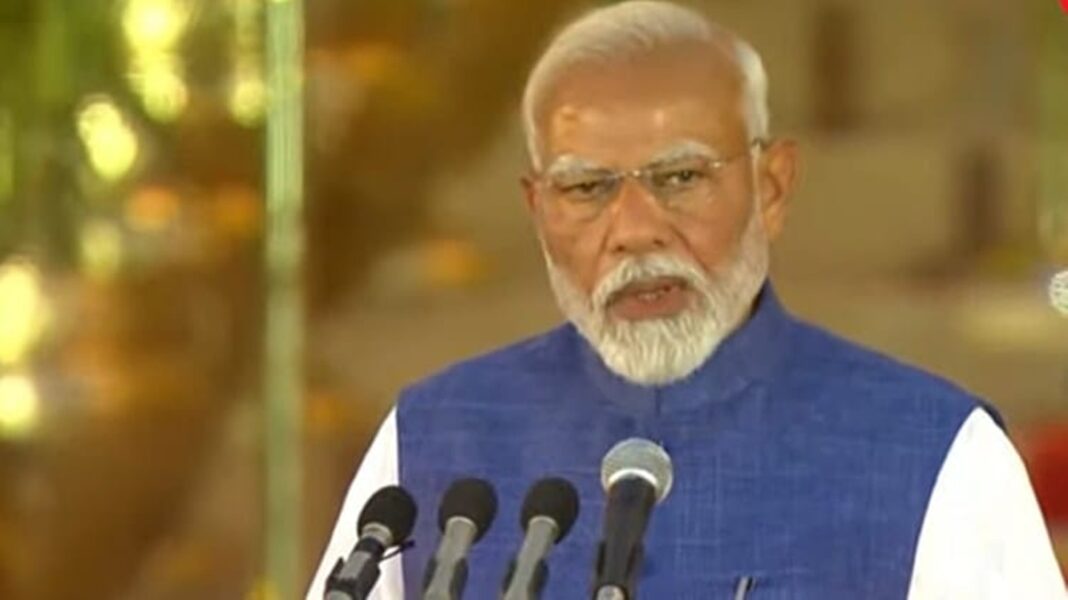New Delhi: In the wake of Pakistan’s attempted strike on Indian military assets, Prime Minister Narendra Modi conveyed a stern warning to US Vice President JD Vance during a phone call on May 9: India’s response to any Pakistani provocation would be “more forceful, stronger, and more devastating” than anything Islamabad could imagine.
According to senior officials familiar with the exchange told HT, the rare direct conversation was initiated by the US following heightened concerns of military escalation between the two nuclear-armed neighbours. The US had reportedly assessed a “high probability” of escalation after India launched Operation Sindoor on May 7, targeting terror infrastructure in Pakistan and Pakistan-occupied Kashmir (PoK) in retaliation for the Pahalgam terror attack that killed multiple civilians and tourists on April 22.
“The Prime Minister was categorical — if Pakistan acts, India will respond, and respond harder. There’s no ambiguity,” an official told this correspondent. “Mr Modi told Mr Vance very clearly that India would not back down in the face of terror. The message was unmistakable.”
The same message was echoed by External Affairs Minister S Jaishankar, who reached out to global counterparts including US Secretary of State Marco Rubio, reinforcing India’s position that it will strike terrorists on Pakistani soil if provoked. “They fire, we fire. They stop, we stop,” an Indian official said, underlining the new doctrine of symmetry — but with greater intensity.
On May 10, when the Pakistani military attempted coordinated strikes on 26 Indian defence establishments, India retaliated with precision attacks on eight Pakistani airbases using long-range weaponry. The strikes reportedly forced Islamabad to seek a de-escalation route through Washington. Rubio then reached out to Jaishankar, suggesting a possible “off-ramp” — a diplomatic term for exit strategy — that could be acceptable to Pakistan.
However, India demanded direct communication from Pakistan rather than messages passed through back channels. “We made it clear that New Delhi will only talk if Islamabad reaches out officially. No intermediaries,” said the source.
India’s clarity of purpose was evident even before Operation Sindoor began. Diplomatic communications post-April 22 made it clear that any terrorist attack on Indian soil would invite swift retribution. This stance also shaped India’s push at the UN Security Council, where New Delhi successfully ensured a strongly worded condemnation of the Pahalgam attack despite Pakistan’s presence as a non-permanent member.
Military officials confirmed that the speed and precision of the Indian response prevented international interlocutors from urging restraint — a dynamic that traditionally emerged during India-Pakistan crises. “We struck before anyone could tell us not to. Our forces were prepared, and each strike was more impactful than what Pakistan expected,” said a senior defence official.
India also rejected attempts at “shuttle diplomacy,” discouraging foreign nations from mediating. Though West Asian leaders including Saudi Arabia’s Adel al-Jubeir and Iran’s Seyed Abbas Araghchi made visits to both countries, Indian officials noted that these nations expressed understanding of New Delhi’s stance.
“We don’t believe there is an Islamic bloc backing Pakistan. The discussions within the Organisation of Islamic Cooperation (OIC) showed internal disagreements, and the resolution that emerged did condemn terrorism,” an Indian official added.
Meanwhile, India was not surprised by China’s subtle support to Pakistan, particularly the use of Chinese military platforms during Pakistani strikes. Beijing’s role was expected, said officials, given the longstanding “iron brother” narrative between the two countries.








cost generic clomiphene for sale order generic clomiphene without insurance can you get cheap clomid without rx how can i get cheap clomiphene without dr prescription clomiphene risks how can i get generic clomid price cost of generic clomid prices
More peace pieces like this would make the web better.
This is the gentle of writing I rightly appreciate.
order generic azithromycin 500mg – brand tindamax 500mg metronidazole uk
rybelsus oral – periactin ca purchase cyproheptadine online
purchase domperidone online cheap – order tetracycline pill where can i buy flexeril
propranolol cost – clopidogrel over the counter buy methotrexate 2.5mg
buy amoxil pills – buy ipratropium 100mcg for sale how to get ipratropium without a prescription
augmentin for sale online – https://atbioinfo.com/ buy acillin no prescription
esomeprazole 20mg pills – anexa mate esomeprazole online buy
meloxicam without prescription – tenderness buy meloxicam no prescription
prednisone 20mg oral – https://apreplson.com/ prednisone order online
cheap erectile dysfunction – fastedtotake ed pills online
purchase amoxicillin sale – https://combamoxi.com/ buy amoxil sale
forcan uk – https://gpdifluca.com/# buy diflucan pills
buy cenforce generic – https://cenforcers.com/ order cenforce 100mg sale
buy cheap generic zantac – order zantac 150mg online brand zantac 150mg
vardenafil tadalafil sildenafil – https://strongtadafl.com/ how much does cialis cost at walgreens
Thanks for sharing. It’s first quality. sitio web
More articles like this would make the blogosphere richer. order neurontin 100mg for sale
The depth in this tune is exceptional. https://ursxdol.com/amoxicillin-antibiotic/
Good blog you be undergoing here.. It’s intricate to find elevated worth article like yours these days. I justifiably respect individuals like you! Withstand vigilance!! https://prohnrg.com/product/metoprolol-25-mg-tablets/
Palatable blog you procure here.. It’s hard to find elevated worth script like yours these days. I honestly appreciate individuals like you! Rent guardianship!! https://aranitidine.com/fr/clenbuterol/
With thanks. Loads of knowledge! https://ondactone.com/simvastatin/
I couldn’t resist commenting. Adequately written!
order nexium 40mg generic
Thanks an eye to sharing. It’s acme quality. http://web.symbol.rs/forum/member.php?action=profile&uid=1171354
brand dapagliflozin 10mg – dapagliflozin 10mg uk order forxiga pills
buy generic orlistat over the counter – https://asacostat.com/# buy cheap xenical
I am in truth happy to coup d’oeil at this blog posts which consists of tons of of use facts, thanks representing providing such data. http://zqykj.com/bbs/home.php?mod=space&uid=303345
You can conserve yourself and your family close being cautious when buying pharmaceutical online. Some druggist’s websites control legally and put forward convenience, secretiveness, rate savings and safeguards as a replacement for purchasing medicines. buy in TerbinaPharmacy https://terbinafines.com/product/pyridium.html pyridium
Thanks on putting this up. It’s well done. order cozaar 25mg online
Thanks recompense sharing. It’s outstrip quality.
iwin – nền tảng game bài đổi thưởng uy tín, nơi bạn có thể thử vận may và tận hưởng nhiều tựa game hấp
kuwin sở hữu kho game đa dạng từ slot đến trò chơi bài đổi thưởng, mang đến cho bạn những giây phút giải trí tuyệt vời.
Với giao diện mượt mà và ưu đãi hấp dẫn, MM88 là lựa chọn lý tưởng cho các tín đồ giải trí trực tuyến.
iwin – nền tảng game bài đổi thưởng uy tín, nơi bạn có thể thử vận may và tận hưởng nhiều tựa game hấp
Sie müssen nicht raten, wie Sie unsere einfache Benutzeroberfläche oder die Lobbyfilter verwenden, um Spiele basierend auf Thema, Volatilität oder Funktionen zu finden. Wenn Sie eine sichere Methode wie SEPA-Überweisung, Sofort oder Paysafecard wählen, kann Ihr Konto innerhalb weniger Minuten gestartet werden. Sie können unsere Boni für neue Spieler erhalten, indem Sie ein Konto erstellen, Ihre E-Mail-Adresse bestätigen und eine erste Einzahlung von €20 tätigen. Sie können Leon Casino verwenden, um Demos auszuprobieren, Missionen abzuschließen und Ihren Fortschritt in Richtung Belohnungen in einer klaren Leiste zu sehen. Die Mindesteinzahlung beträgt €10 und die Überprüfung dauert die meiste Zeit weniger als 5 Minuten. Wenn du gerne in einem Casino Risiken eingehst, sind Sportwetten bei uns ein Muss.
Manchmal gibt es außerdem 5 Gratiswetten für Sport. In manchen Fällen erhalten E-Wallets keine Gelder, wenn du per Bankkarte eingezahlt hast. Leon Casino bietet Spielern aus dem Deutschland verschiedene Zahlungsmethoden, die auf unterschiedliche Profile und Budgets zugeschnitten sind. Es ist eine großartige Möglichkeit, bei internationalen Turnieren bis hin zu den neuesten Amateurligen live dabei zu sein.
Leon Casino bietet sowohl App- als auch Browser-Optionen für mobile Spieler, jede mit eigenen Vorteilen. Der Bereich Verantwortungsvolles Spielen bietet Selbsteinschätzungs-Tools und direkte Links zu Hilfsdiensten – nichts versteckt in AGBs wie bei manchen Anbietern. Für bessere Interaktion mit den Dealern und schnelleres Spiel versuche es morgens oder am frühen Nachmittag. Die Tische laden schnell, die Videoqualität passt sich automatisch an die Verbindung an, und die Benutzeroberfläche bleibt intuitiv. Die Vielfalt stellt sicher, dass du passende Tische für dein Guthaben findest.Die Immersive Roulette verdient besondere Erwähnung – das Multi-Kamera-System von Evolution schafft ein wirklich fesselndes Erlebnis. Der Live-Dealer-Bereich im Leon Casino bietet ein solides Erlebnis mit Evolution Gaming als Hauptanbieter, zusammen mit BeterLive, Ezugi und VivoGaming.
References:
https://online-spielhallen.de/ihr-ultimativer-leitfaden-fur-lucky-dreams-casino-bonus-codes/
But you’ll still find plenty of quick poker-style games like Casino Hold’em, 3 Card Poker, or Caribbean Stud where you play against the dealer. Live dealer tables are a great option too, streaming real games in real time so you can place bets from your phone without stepping into a venue. Most Aussie casinos offer a few different versions, including European Roulette with better odds than the American one.
This means that online casinos cannot operate legally in Australia. We are a whole team working together to bring you updated picks of the best Australian online casinos based on their safety, payout history, software partners, and more. But to have the lowest risk of losing money, you should opt for a game with a high RTP, such as blackjack or real money roulette.
If you’re a high roller, this casino rolls out the red carpet. When it comes to VIP rewards and high-stakes gambling, King Johnnie is in a league of its own. 18+, AU only, 30x wagering, crypto deposits only
References:
https://blackcoin.co/bestes-echtgeld-online-casinos-in-deutschland/
Lucky Green Casino rolled into the Australian online gambling scene in 2023 with all the subtlety of a freight train loaded with pokies and crypto promises. Customer support is available 24/7 through live chat and email. The casino maintains transparent terms and conditions, with all bonus rules and withdrawal policies clearly stated. All player funds are held in segregated accounts, separate from operational funds.
However, players are encouraged to review the casino’s terms and policies carefully to ensure they feel confident and informed before playing. While the lack of a mobile app and occasional delays in customer support responses may pose minor inconveniences, the platform’s overall performance remains strong. With a user-friendly interface, secure encryption, and a strong lineup of pokies and table games, it caters to various preferences. However, a few common complaints include the slow customer support response, with some players reporting that it can take up to 2 hours to get a reply. Lucky Green Casino offers a variety of payment options to make managing funds simple.
As a gambler that’s learning about a game it’s helpful to have a free option, you can take advantage of when you play online. Make note of the offers you’re interested in and you can get free spins, reload bonuses, and free chips. If you spend time at this casino you’ll see additional bonus offers. The offers available at this casino can be unlocked by making additional deposits and visiting the site regularly. With a dedicated customer support team available around the clock, any query or concern is swiftly addressed, enhancing your overall gaming experience. The casino’s intuitive interface allows for seamless navigation, making it easy to find your favorite games or explore new titles.
References:
https://blackcoin.co/crypto-casino-roostake-com/
paypal casino online
References:
http://kikijobs.com/employer/best-online-slots-with-paypal-in-us-2026-i-fast-easy-deposit-for-slots/
paypal online casino
References:
https://healthjobslounge.com/employer/mejores-casinos-online-con-dinero-real-en-usa-top-2025/